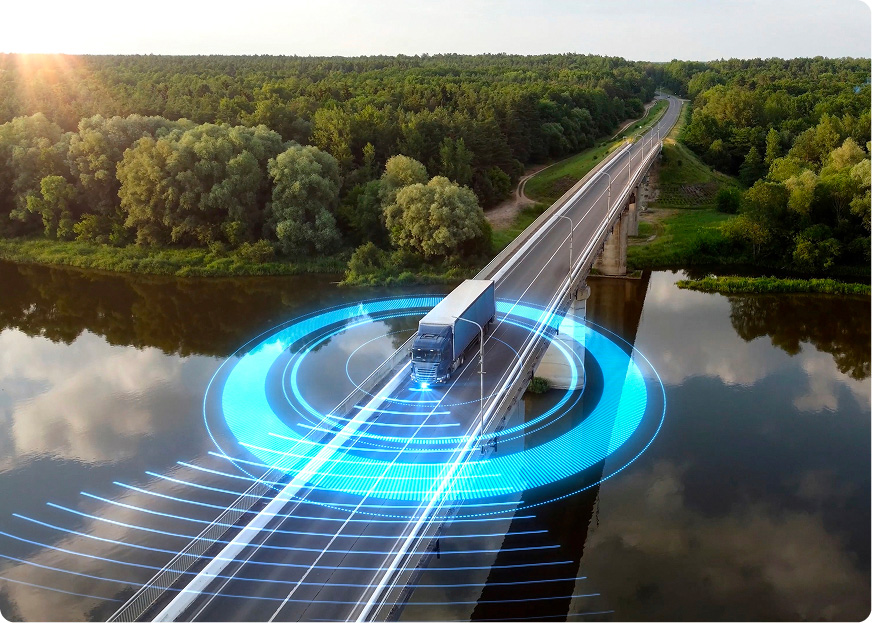On August 29, 2025
Innovative Transportation Solutions: The Road Ahead for Logistics
The future of logistics depends on innovative, data-driven transportation solutions.

On August 29, 2025
The future of logistics depends on innovative, data-driven transportation solutions.
Innovative transportation solutions are the driving force behind the logistics transformation. Faced with surging costs (energy, labor, compliance) and the environmental imperative—for example, heavy goods vehicles account for 22% of domestic freight transport emissions in France—the sector is forced to adapt in order to thrive.
Innovation is actively being implemented, with a marked acceleration fueled by Artificial Intelligence (AI) technologies.
Data is the cornerstone of modern logistics. According to Gartner, over 60% of supply chain companies are expected to adopt Machine Learning solutions by 2025. These solutions allow, for instance, a major retail player to predict seasonal demand peaks with increased accuracy, ensuring deliveries arrive at warehouses just in time. Pioneering companies have already seen a reduction in their logistics costs that are 15% lower than those of the competition thanks to this software (McKinsey & Company). The adoption of digital twins is also accelerating: over half of industrial companies (54%) plan to use them by 2026 to simulate and validate the impact of a new multimodal transport network before even investing in physical infrastructure.
While fully driverless vehicles on a large scale are still under development, adoption is accelerating, as shown by the growth of the autonomous truck market, valued at $356.9 billion in 2024. AI is already optimising transport decisions in real-time: intelligent systems now enable a truck convoy to maintain a minimal and constant safe distance on the highway, reducing air resistance and saving up to 10% of fuel. Simultaneously, companies are deploying robot-taxis for last-mile deliveries in specific urban areas, as seen with pilot projects in Asia and Europe starting in 2025.
The industry is at the forefront of the transition away from fossil fuels. The global hydrogen market, expected to reach $603.3 billion by 2034, attests to this ambition. For example, several large logistics groups are testing fleets of heavy trucks running on green hydrogen on specific corridors. Similarly, for the last mile, the integration of electric cargo bikes has allowed some European cities to reduce CO2 emissions from their parcel deliveries by over 30% in low-emission zones.
Optimisation no longer lies in choosing a single mode, but in the perfect combination guided by data analysis. Multimodal AI allows a logistics operator to simultaneously analyse sea freight costs, available rail capacity, and the carbon impact of road transport to automatically recommend the best route. This has led, for example, to the increase in combined transport (rail-road or waterway-road) which already represents 40.5% of rail freight transport in France, offering a greener and more resilient alternative to road congestion.
Innovative transport proves that economic efficiency and environmental responsibility are not opposing forces, but interconnected.
AI-driven route optimisation allows a carrier to avoid traffic jams, not only saving time and reducing labor costs, but also eliminating millions of unnecessary kilometers each year, thereby reducing CO2 emissions. Furthermore, resource pooling has become a common practice, where a collaborative platform allows competing companies to share the same truck for a delivery to a common destination, ensuring a maximum fill rate and dividing the cost and environmental footprint per customer.
The timeless goal of logistics—The Right Goods, in the Right Place, at the Right Time—is now being achieved with unprecedented efficiency and durability, propelled by technical innovation and the intelligent use of data. FM Logistic researches and implements these innovative transportation solutions, leveraging AI and data, to move goods and meet the specific needs of its customers.
Transport your goods with FM Logistic. Now is the right time.
How can we help you ?
What are you looking for?
Fill in the form